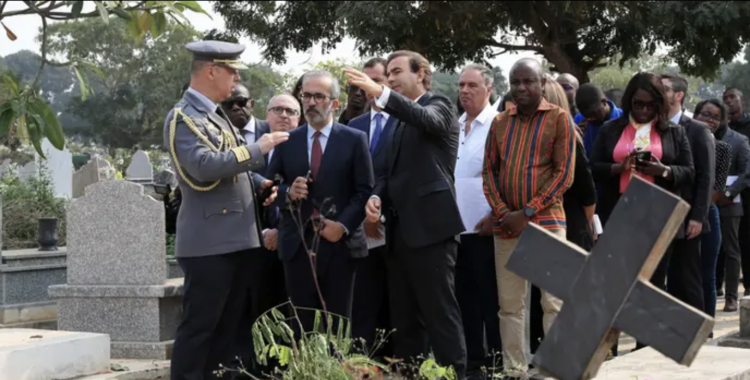Paulo Rangel, who ended a two-day visit to Angola on Saturday, highlighted Portugal's "infinite gratitude" to the Angolan people and their authorities for allowing and supporting efforts to rehabilitate the plots of the Santa Ana cemetery where the mortal remains of more than 450 Portuguese soldiers.
"This shows what the true spirit of reconciliation is, which is to honor these soldiers who died in the service of their country, regardless of whether they were in a war that was unjust as was later recognized. But obviously these soldiers fulfilled their moral and gave their lives for their country", he stressed.
Regarding the Angolan authorities, he highlighted their willingness and generosity to reconcile with history, allowing them to pay homage and give dignified treatment to the Portuguese who are buried in this cemetery in Luanda.
Stressing that this is "an act of enormous dignity" and "an example for the world", Paulo Rangel underlined that Angola is seen in the international community as a country that is "a great promoter of peace".
"As a Portuguese and for all Portuguese people, this is a gesture that Angola has towards us that marks the 50th anniversary of the 25th of April and the 50th year of Angola's independence. It is in this cycle that this work will be carried out and completed, it is a very sensitive and moving moment for all of us, in particular for the military personnel of the Armed Forces of both countries", said the head of Portuguese diplomacy.
He also considered that in commemorating this fiftieth anniversary, Portugal has given "a sign of reconciliation", not only in relation to Angola, but also to other countries that were colonies and with which it currently maintains a bilateral relationship "of equals".
He also recalled that the 25th of April was not a cause, but also a consequence of independence: "There was a struggle for independence that was also the driving force behind the 25th of April. Democracy and freedom in Portugal were also achieved because there were people in Africa who were fight for your freedom".
"I think that in these 50 years we have an obligation to pay homage to all those who contributed so that we can be here today with excellent relations and mutual respect", said the minister, who ended the visit by evoking the Portuguese and Angolan homeland with Fernando Pessoa's poem "O menino de sua mãe".
The Portuguese ambassador to Angola, Francisco Alegre Duarte, said that the current cemetery space "has little to do with what he found in April 2022", highlighting that this is a tribute to all those who fell and were "brothers in arms", those who fought for Portugal and those who fought for Angola.
For Ludgerio Pelinganga, President of the Federation of Former Combatants and Veterans of the Country of Angola, a partner of the League of Combatants of Angola, who has been following the requalification work in this context since the beginning, he also considered this tribute to the combatants to be important.
"It helps to appease the spirits and improve the combatant's own relationship of peace and conscience," he said.
The recovery of the spaces in the Santa Ana and Alto das Cruzes cemeteries, in Luanda, where Portuguese military remains are buried, is part of the Strategic Structuring Program "Conservation of Memories" of the League of Combatants (LC), known as "Operation Embondeiro", started in 2019.
The work is taking place in the Alto das Cruzes cemetery, where 123 soldiers who fell during the Great War are buried, and in the Santa Ana cemetery, with 434 graves of soldiers who fell during the Overseas War.
They consist of the recovery of graves that will be in the final spaces of the military plots, paving of spaces between graves, recovery of existing monuments and ossuaries and the exhumation of seven graves, in the Alto das Cruzes cemetery, and 398 graves, in the Santa Ana cemetery, which will result in the liberation of these cemetery spaces.
The remains of the exhumed graves will be deposited in the ossuaries, which have since been recovered in ongoing work.
The works were delivered, through a competition, to the company Teixeira Duarte and are budgeted at 500 thousand euros.
In a later stage, it is planned to exhume a few more graves in various locations throughout the Angolan territory and transfer them to ossuaries in Luanda or to ossuaries to be built in some cemeteries where there is a greater concentration of graves.
In Angola, according to official data, the remains of 1548 combatants who fell in the service of the Portuguese Armed Forces are referenced, distributed across 187 locations/cemeteries.
During the colonial war, 800,000 soldiers were mobilized to the theaters of operations in Angola, Mozambique and Guinea, 30 percent of which came from local recruitment.
Of the total casualties, around 9000 were killed and 15,000 were injured or disabled.







